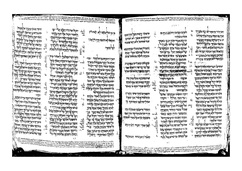|
Jeremiah 4
Jeremiah 4 is the fourth chapter of the Book of Jeremiah in the Hebrew Bible or the Old Testament of the Christian Bible. This book contains prophecies attributed to the prophet Jeremiah, and is one of the Books of the Prophets. Chapters 2 to 6 contain the earliest preaching of Jeremiah on the apostasy of Israel.[1] TextThe original text of this chapter, as with the rest of the Book of Jeremiah, was written in Hebrew language. Since the division of the Bible into chapters and verses in the late medieval period, this chapter is divided into 31 verses. Textual witnessesSome early manuscripts containing the text of this chapter in Hebrew are of the Masoretic Text tradition, which includes the Codex Cairensis (895), the Petersburg Codex of the Prophets (916), Aleppo Codex (10th century), Codex Leningradensis (1008).[2] Some fragments containing parts of this chapter were found among the Dead Sea Scrolls, i.e., 4QJerc (4Q72; 1st century BC),[3] with extant verses 4:5(‑6), 13‑16 (similar to Masoretic Text).[4][5][6] There is also a translation into Koine Greek known as the Septuagint, made in the last few centuries BCE. Extant ancient manuscripts of the Septuagint version include Codex Vaticanus (B; B; 4th century), Codex Sinaiticus (S; BHK: S; 4th century), Codex Alexandrinus (A; A; 5th century) and Codex Marchalianus (Q; Q; 6th century).[7] Among the Chester Beatty Papyri (BHK: Beatty) are the fragments of Jeremiah (Rahlfs 966; Chester Beatty Library (CBL) BP VIII), dated from the late second century or early third century AD, containing Jeremiah 4:30–5:1; 5:9–13; 5:13–14; 5:23–24.[8][9] ParashotThe parashah sections listed here are based on the Aleppo Codex.[10] Jeremiah 4 is a part of the Third prophecy (Jeremiah 3:6-6:30) in the section of Prophecies of Destruction (Jeremiah 1-25). {P}: open parashah; {S}: closed parashah.
Jeremiah laments over Judah (4:1–18)Verse 1
Verse 2
The word "him" is capitalised in the New King James Version: "Him", i.e. God. The Jerusalem Bible reads:
Verses 3–4Four metaphors relating to repentance and reformation:
Leviticus 25:1–13 prescribed that the people of Israel could work the fields for six years, but in the seventh year, the land was to remain fallow. Sorrow for the doomed nation (4:19–31)Verse 23
In popular culture
See also
References
Bibliography
External linksJewishChristianInformation related to Jeremiah 4 |
||||||||||||||||||

